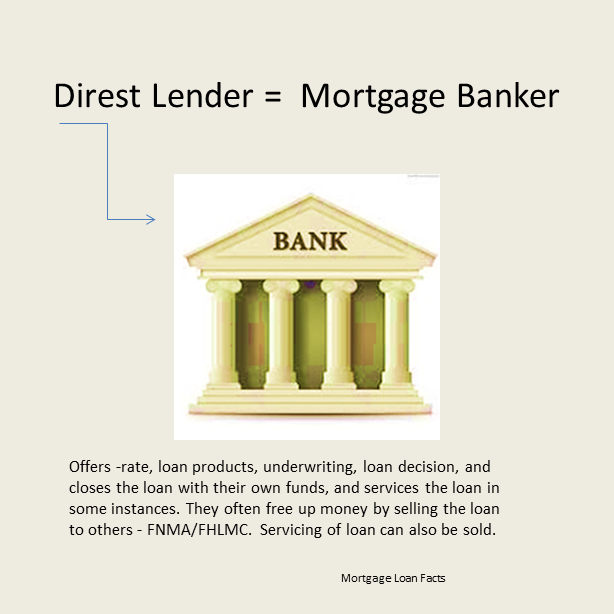What is the Difference between the Mortgage Broker vs Direct Lender ..post update 7-06-23

The Mortgage Broker is the mortgage professional who takes your mortgage loan application at a non-depository institution. He/she requests your personal financial information including your employment history, your income history, your saving ability, and your financial obligations. They will review your credit once you have authorized them to pull your credit report. * This post has been updated
A Mortgage Broker usually owns the office and then he/she may have other loan representatives, account executives, or loan experts, whichever title they possess; take the application and process the loan at times.
The Direct Lender- Bank, Mortgage Company
The Direct Lender- takes the mortgage application from start to finish. This includes verifying the applicant’s income, assets, and entire financials. The mortgage underwriters who are approved and work for the lender; underwrite the loan according to the investor guidelines and to whom the loan will be sold to.
Most often conventional loans are sold to Fannie Mae or Freddie Mac. If the product is FHA or VA it will go to these government agencies. depending upon the loan product.
However, sometimes a Direct Lender will service the conventional loan or hold them in-house. By selling the loan to investors, their money is freed up to offer more mortgage financing.
FHA/VA loans made by Direct Lenders have their own policies, procedures, and underwriting guidelines as these are often more lenient for these types of applicants.
Note: In 2019 Fannie Mae announced its intention to purchase certain FHA-insured and VA-guaranteed mortgage loans from certain Fannie Mae multi-class structured securities. Re: Fannie Mae
The Broker Must Be Licensed- but with a different license than the direct lender
The Mortgage Broker’s Office is the one who has the license to run the origination’s office, has to put up the bond, carries errors, and has Omission Insurance. He/she must also meet certain net worth parameters. Not only this but his/her mortgage experience is relevant and important to the approval process.
The Broker has more choices as they are usually signed up with several lenders. This is an advantage of the Broker Office. All lenders do not always offer the same interest rates, products, or guidelines. The Broker can go with the lender that meets the needs of your application.
The Criterion of Mortgage Broker Office
The Mortgage Broker is approved at the State level. They must have so many hours of mortgage study under their belt before becoming a Mortgage Broker.
The Mortgage Broker’s office has certain federal rules and guidelines as well. They must have the Fair Lending sign in the office and clearly indicate their adherence to all Fair Lending rules and regulations. These offices are not without restrictions, rules, and regulations and have never been.
The Loan Professionals within the office, as well as the Mortgage Broker, must be licensed. They are required to have a certain amount of experience as well.
Usually, they will be involved in a continuous educational program and must keep up with mortgage lending changes and compliance for federal and state, within the industry. The offices will also employ mortgage loan processors when large enough who process the mortgage loan.
Mortgage Processors In The Broker’s Office
These mortgage processors must also be licensed under certain circumstances (in some states); when they deal directly with the mortgage applicant obtaining pertinent financial information.
The Mortgage Broker has their respective place in lending and those who have survived the crisis, have obviously proven that. They serve the public who are more comfortable with a smaller office concept.
This gives the applicant a place where they can get a great working relationship with their financial situation. They get the one-on-one care that sometimes may be lacking in a larger office. Meaning, sometimes, the Broker’s office does not have as many requests for applications as the Mortgage Banker does; therefore each applicant is more important and gets the best possible care.
The Loan Originator/Representative @ the Broker Office
The Loan Originator/Representative takes the application and sometimes runs the application through the automated underwriting system. They will then explain what products they can offer, and the required documentation needed.
Loan Representative will then hand over the file to the processor who will process the mortgage loan file. They will gather the documentation needed from the applicant and sometimes send out verifications.
This included employment, bank accounts, retirement funds, any other property that may be owed, and the entire questions/answers on the application. Once all information is satisfactory the Mortgage Broker’s representative will start the process of finding the right lender for you, the applicant(s).
The aforementioned, simply means that they go to a lender who is approved through the agencies, who will do the final underwriting of the loan, approve, and will furnish the money to close the loan in their name.
Most of these lenders will in turn sell and assign these loans to the investors such as Fannie, Freddie, FHA, or another purchaser of mortgage pools.
Brokers Do Not Close The Loan In Their Name – the Direct Lender does…
Most Broker offices do not close loans in their own name or furnish the money for closing as already suggested above. Only on rare occasions, they may if their net worth and financial backing are sufficient to furnish the funds for closing with warehouse banking privileges and other criteria.
The loans are still usually underwritten by the lender who will receive the loan once it is closed. Usually, these Mortgage Brokers have been in business for a while and have established their lending experience, with capital and employees to perform all functions.
The Broker’s Office Does Not Have The Liability of a Lender
Brokers do not have the liability that those who close and fund in their name have. Most Broker offices do not want the liability to close and fund in their name. Brokers sell the loan immediately to a servicing lender and/or one who will sell the loan immediately to the agencies.
Broker Fees
With the RESPA changes, the broker fees are in with the lender fees on the good faith estimate, at this moment (although I hear this may be changing) but should be broken out for you and explained. It is under the cost to you for this loan.
Lenders Who Service Loans
Sometimes the lender services the loan. The agencies pay them a servicing premium for their service of accepting the mortgage loan payments during the term of the loan.
Usually, these lenders are Mortgage Bankers who are depository institutions. There are Mortgage Companies who are standalone lenders who are approved but usually sell the loan immediately.
Summary
This is not all-inclusive nor does it give you every detail of how a Mortgage Broker can work for you. It does give you the difference in how the origination process takes place within a Mortgage Broker’s office.
The Mortgage Broker’s responsibility is to get you the most appropriate interest rate, closing cost, and loan that meets your needs. In fact, they are your contact person and should be looking out for you, the applicant. They are no different than Direct Mortgage lenders/Bankers in this respect.
It is the Broker’s duty to provide a quality professional service by helping you understand your mortgage product. The interest rate with any fees, the closing cost fees, and the disclosure that you were given. Actually, “anything” that is to do with the mortgage transaction is their responsibility.
New laws dictate experience and professionalism in all areas of mortgage lending including the Mortgage Broker’s responsibilities.




Very helpful information about mortgage broker and a lot more can't differentiate between a an agent and a broker but you have explained the things in really good manner.
Thank you so much Dubai Real Estate for stopping my to read this. You are right, so many do not know the difference.
You are right.. mortgage professionals didn't turn the market upside down. In fact there is no single group that did.
Thank you for coming by to read and comment. It was a collection of many things that has affected our ability to live as we once did in the USA.
Thank you again.
Thank you for coming by to read and comment. It was a collection of many things that has affected our ability to live as we once did in the USA.
Thank you again.
The difference between a an agent and a broker now is clear 🙂
That's right. That is why you should be careful when looking for such services. Mortgage brokers can help you in several ways–be it for your home loans or property investments. Getting a mortgage broker can help you save time looking for the mortgage with the best interest. Another thing, he can even advise you through the process. A good mortgage broker should be detail oriented. He must be able to point out details for you with precision. Also, you should take time to look for a broker who will prioritise your interests. Also, experience in the industry wouldn't hurt. The more years he has spent in the industry means that he understands the ins and out of the market.
Thank you Investimenti Immobiliari for stopping here and getting something of value.
Mortgage Broker, thanks for adding to my post. I appreciate the details you have given. Thanks for coming by.